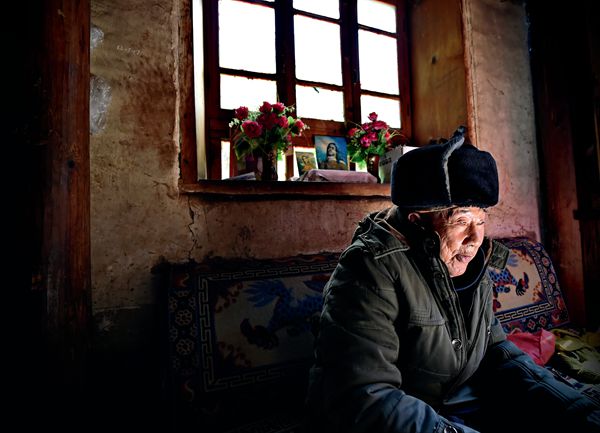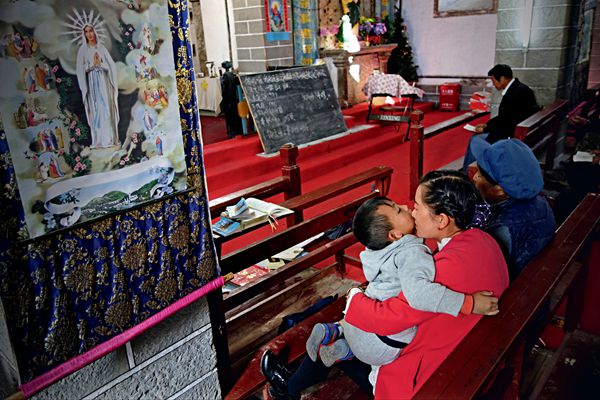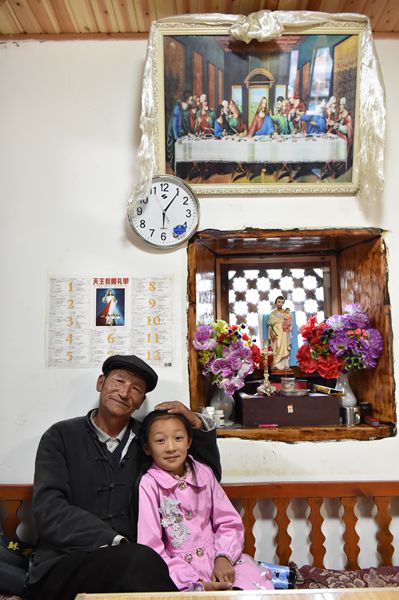Catholic Church in a Tibetan village
- By Lu Rucai
 0 Comment(s)
0 Comment(s) Print
Print E-mail China Today, February 6, 2017
E-mail China Today, February 6, 2017
Christian Names
In 1951, religious activities at Cizhong Church folded when foreign priests went back to their native countries. At the same time, a provincial-level primary school was set up here. Xiao Jieyi, due to his interactions with foreign priests, was sent to a labor camp in Lijiang. When, 30 years later, he came back to Cizhong Village, the church had fallen into disrepair and had a meager congregation.
In the 1980s, when religious freedom was just restored in China, no one dared to enter the church. Xiao Jieyi was the first to open its front door. Gradually, under his guidance, local Catholic activities resumed.
|
A mother and her child share a sweet moment. |
Xiao Jieyi showed us the handwritten stories in his home about Cizhong Church. The love he harbors for his land and religion shone through as he told us the history of Cizhong and its people. He knows, he told us, hundreds of hymns. He sang us a few, and also the French folk song Le Coucou.
 |
|
Xiao Jieyi. |
Wu Gongdi, Christian-named Augustine, was born in 1949, and is now head of the Roman Catholic Church in Cizhong. Rovi baptized him when he was eight days old. He told us that his great grandfather walked all the way from Tibet to Yunnan and settled here, and married a local girl Christian-named Mary. After they married, his great grandfather converted from Tibetan Buddhism to Catholicism. The family has since remained Catholic.
|
Wu Gongdi and his granddaughter Maria. |
In the ensuing 20 years after the resumption of religious activities, Cizhong Church had no full-time priests. Every Christmas, therefore, a locum priest came from Dali parish to help. Wu Gongdi and his colleagues now manage the daily affairs of the church while Xiao Jieyi, when in good health, comes to lead the church choir on Sundays.
Wu Gongdi’s granddaughter Maria, her Chinese name Zhang Ruiying, is in the fourth grade of a primary school. Among Catholics of Cizhong, in the past they had solely Christian names such as David, Teresa, and Angela. But now, to apply for an ID card they need a Chinese name, and people often pick one randomly. It’s therefore common here for an old man and his granddaughter not to share the same Chinese family name, although it’s unusual in the rest of China. Maria says that she sometimes goes to church with her grandpa, but not often. "We have freedom of religious belief according to the current law. But at the same time, parents cannot force their children to follow any particular religion," Maria said. Wu Gongdi believes that all religions, whether Tibetan Buddhism, Catholicism or the Naxi Dongba faith have in common the mission of encouraging people to be good.








Go to Forum >>0 Comment(s)